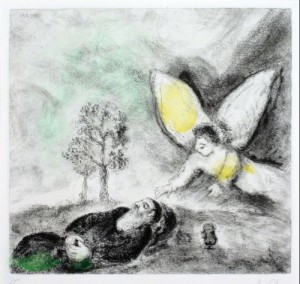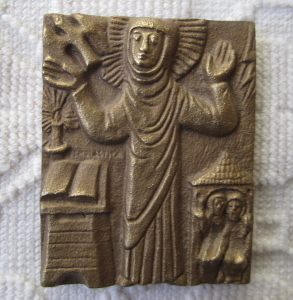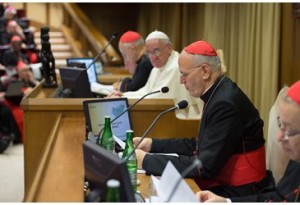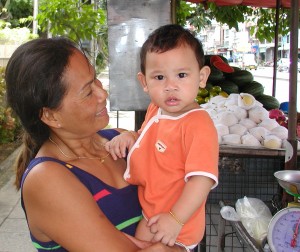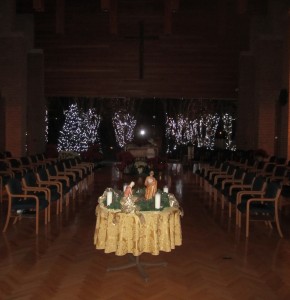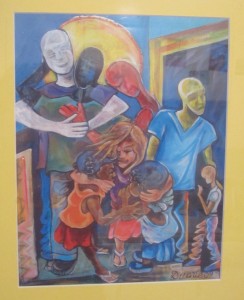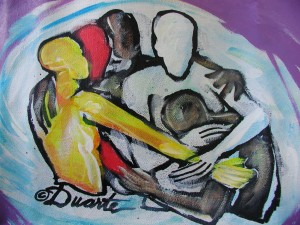
Painting by Richard Duarte Brown
Originally published in the Catholic Times, 9. 1315
A few days ago, while driving to work, I heard a story on NPR about the thousands of immigrants arriving on the small Greek island of Lesbos, refugees fleeing war and oppression in Syria, looking for a place to live. They risked a dangerous journey leaving everything behind and set off toward an unknown future. Husbands and wives, parents and children, friends and relatives, all willing to trust their lives to people and places they do not know.
Listening to reporters interviewing newly arrived refugees, I marveled at the joy in their voices. Thrilled to have survived the journey and to be standing on solid ground in a place free of war and the atrocities that accompany it, they spoke with such hope, such faith in God, or if not in God, in fellow human beings.
I wanted to rejoice with them, but concern tempered my delight as I wondered what the road ahead would bring for them: Mounds of paperwork and bureaucracy from governments hesitant to welcome so many people needing work and aid. Hostility and resistance from those who will feel threatened by their presence, by their “otherness.” Soon, frustration will replace the euphoria of the refugees’ first taste of freedom from constant fear and suffering.
Tragedy already darkens Syrian refugees’ arrival. The United Nations refugee agency reports that over 2,500 people have died this year trying to make the dangerous ocean crossing.
Driving home from work that same day, I heard an inspiring story of Icelanders who had formed a Facebook group, “Syria is Calling,” and is pressuring their government to take in more than the 50 refugees it had offered to accept—a lot more, 5,000. While the large number of people the group is proposing to welcome is impressive, it was the outpouring of individuals’ willingness to help that stirred my heart.
People offered to open up extra bedrooms in their homes and provide food, money, and house wares to help new arrivals settle in. This personal response is more demanding than putting a check in the mail, which is my plan. It means living with people who have different beliefs and values. In some cases, like sharing one’s home with strangers or welcoming them into your city, such action means daily encountering the “other” with openness and reverence for their personhood. It means, in the midst of serious complexities, maintaining the belief that we are more alike than different.
This post from “Syria is Calling” eloquently proclaims this truth: “Refugees are our future spouses, best friends, our next soul mate, the drummer in our children’s band, our next colleague, Miss Iceland 2022, the carpenter who finally fixes our bathroom, the chef in the cafeteria, the fireman, the hacker and the television host. People who we’ll never be able to say to: ‘Your life is worth less than mine.’”
These words challenge all of us around the globe to examine our own attitude toward the “other,” not only the Syrian refugees, but the marginalized people who live in our own cities and neighborhoods.
The Letter of Saint James, included in this Sunday’s readings, speaks forcefully about the responsibility of Christians to put their faith into action: “If a brother or sister has nothing to wear and has no food for the day, and one of you says to them, ‘Go in peace, keep warm, and eat well,’ but you do not give them the necessities of the body, what good is it? So also faith of itself, if it does not have works, is dead.”
Fear of those who are not like us is no excuse; it is a human failing that must be confronted and transformed by love, a process that can take a lifetime. It is a process that requires encounter.
But suffering and injustice can’t wait for lifetimes. Our faith, our humanity, requires action before we are comfortable. We must respond with love despite our fear, and incrementally, our hearts will change. As Jesus said, love will cast out fear. We are all other to someone. Encounter will transform us: those in position to give and those who receive, privileged with voice and marginalized with none.
© 2015 Mary van Balen


